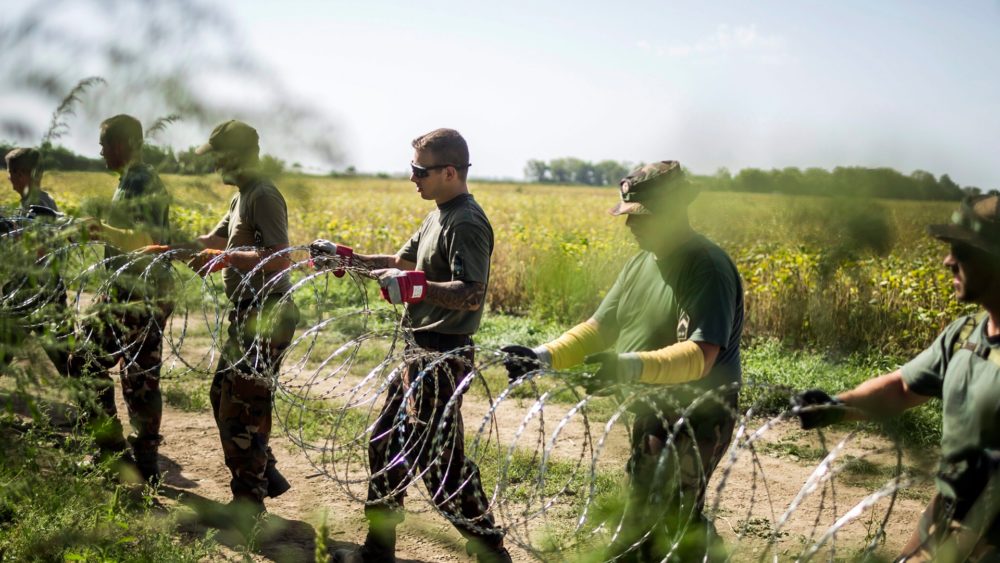Just before the nightmare of the second world war started to explode, the Italian politician and philosopher Antonio Gramsci famously wrote in one of his many prison notebooks: “The crisis consists precisely in the fact that the old is dying and the new cannot be born; in this interregnum a great variety of morbid symptoms appear.”
Today, we truly live in a time of such morbid symptoms. The naive dream of the marriage between “capitalism and democracy” has died. We saw in last summer’s Greek referendum that voting can serve merely as a kind of decoration, and that financial interests (from international monetary institutions to private banks) win out. Instead, we need a system in which democracy really means decision-making by the people, from community organising to general assemblies, from participatory budgeting to self-management.
The dangers of doing nothing are real: there are uncomfortable echoes, among those morbid symptoms, of Europe’s history of fascism.
Just look back at the past few months in Europe: neo-Nazis marching through the centres of our capitals and attacking refugees and foreign-looking bystanders; extreme rightwing governments from Poland to Croatia; the richest countries of Europe – such as Switzerland and Denmark – seizing assets from refugees; more and more countries – including Hungary, Slovenia, Macedonia, Bulgaria, Greece – building border fences; the temporary suspensions of Schengen in countries such as Germany, France and Austria; “outsourcing” refugees to Turkey by investing €3bn in a refugee facility.
In the end, when the boomerang of our Syrian war came back into the very heart of Europe, in the form of terrorism in Paris or Brussels, the only answer the EU leaders had was to send new troops to Syria and to further enhance security, police and surveillance. After 9/11 and so-called humanitarian interventions in Iraq and Afghanistan, we should have learned that terrorism can’t be defeated by throwing new bombs.
Likewise, the refugee crisis – in which a million more people will journey to Europe during 2016 – can’t be solved if the Syrian crisis is not solved. And it can’t be solved unless more than 20 different players (from US to Russia, Israel to Saudi Arabia, Turkey to Qatar etc), including European Union member states, find a common language. If there is no common solution, the only common thing we can expect is war.
That is why, among other things, we need a Pan-European Movement for Democracy. To pose the question of whether we want war or not.
Why “democracy”? What does “democracy”, after all, mean anymore? Isn’t it an empty signifier representing everything and nothing?
It is precisely because the EU did everything to strangle democracy that it has become worth fighting for again.
But it shouldn’t be confused with liberal democracy from the “happy 1990s”, when the “end of history” still concealed the exploding discrepancy between capitalism and democracy.
It is closer to what Jacques Derrida, in one of his last publications, called “la démocratie à venir”, a “democracy to come”: a democracy that, at the same time, comes from the future and happens or should happen right now.
But why a Pan-European Movement for Democracy?
Precisely because the experience of Greece has taught us, once again, that it is not enough for democracy to assert itself in one country alone. Even though the Greek people decided to democratically choose “no” (62% of them) to further austerity measures, it soon turned, under the pressure of the Eurogroup, into a “yes”, and quickly led to a Third Memorandum, and the further privatisations and deregulation that we see today.
Clearly, for democracy to succeed anywhere it has prevailed on a European – and global – level.
Without a Pan-European Movement – which would not only include new political parties but also existing movements such as Indignados and Blockupy – democracy doesn’t have a chance. Europe doesn’t have a chance.
If the “morbid symptoms” which occur daily in all corners of Europe are not constrained to any national state but are the outcome of a deeper problem rooted in the EU itself, then the solution also has to be European. If the refugee crisis has its origins in our foreign policy (or absence of a European foreign policy) then it can’t be solved by building new walls or suspending Schengen. It has to be solved at a European level as well.
If we are not able to restore and re-invent democracy in Europe, we are not just sleepwalking but running into a catastrophe. And the name of this catastrophe, once the period of interregnum is over, is war.
Some might ask, isn’t a Pan-European Movement something that has already been tried? Yes, of course. For the last decade many of us have been participating in similar attempts, from the World Social Forum to the Altersummit, from the occupations of squares to general assemblies, from protests to strikes.
Why should we try again? The answer is very simple: If we don’t try again, we can’t even fail again – we have already lost.
Do you want to be informed of DiEM25's actions? Sign up here










